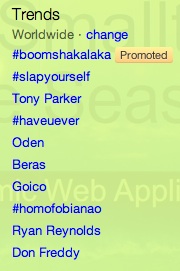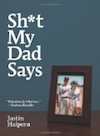social media
September 18, 2011 18:21:42.670
Dare Obasanjo makes some great points about how Facebook is "good enough" compared to FourSquare, FriendFeed (etc, etc) - and analogizes what Facebook is doing to the RSS progression:
I’m reminded a little of the world of RSS readers. A few years ago there was a lot of innovation in client RSS readers from commercial offerings like FeedDemon and NewsGator Inbox to home grown projects like RSS Bandit. However, RSS was eventually added to the big gorilla in client communication tools; Outlook. When this happened a lot of the innovation in this space dried up and it didn’t take long for Outlook to become the dominant RSS reader. This is despite the fact that Outlook didn’t go nearly as deep in the RSS reading technology it provided compared to dedicated RSS readers.
That's pretty much how it goes. Lots of people live in Outlook; whatever RSS functionality Outlook provides is, by definition, good enough for those people. Facebook does the same thing to other social media offerings all the time, and so far, it's working.
Technorati Tags:
facebook
posted by James Robertson
social media
August 3, 2011 9:50:14.051
The guys at Facebook have a grasp of history that stretches back, oh, maybe 15 minutes. Here they are on anonymity:
I think anonymity on the Internet has to go away. People behave a lot better when they have their real names down. … I think people hide behind anonymity and they feel like they can say whatever they want behind closed doors.
Maybe these guys should have a look at the credited authors of the "Federalist Papers" - oh, wait - they were anonymous. Or perhaps at Ben Franklin's work during the same era - published anonymously. While I usually prefer that people attach their names to comments, it's not always the best policy. When the "consensus answer" on a question is X, and you think Y, it can be safer to push your ideas behind a veil of anonymity. One size does not fit all here.
posted by James Robertson
social media
July 25, 2011 8:16:53.138
posted by James Robertson
social media
July 21, 2011 7:52:20.917
Fast Company notes that the Google+ notion of adding people to various circles might not be working out - and is instead leading to "circle fatigue":
Gigaom's Mathew Ingram chalks it up to what psychologist Barry Schwartz has called the "Paradox of Choice," meaning that "too much choice actually makes it less likely [users] will take advantage of a feature." He adds, "The process of filtering hundreds or even thousands of people into groups is time-consuming and somewhat frustrating," and could cause Circles fatigue. AllThingsD strikes a similar tone, highlighting just how complicated friending is on Google Plus compared to other networks.
I'm not following that many people on Google+ yet (or even paying much attention to it, honestly), but - I hit that fatigue point on day one. I've only used two circles thus far: friend and following. I'm not sure what value having two circles even gives me. Facebook still seems more useful, and honestly, having the back end prioritize the messages based on traffic patterns would probably be a whole lot more useful still.
I suspect that Google simply won't make much of wave here (pun somewhat intended). To get traction, they have to compel people to stop using facebook and move over; the sheer force of inertia argues against that. When "everyone you know" is already on Facebook, why do you even care about another system?
Technorati Tags:
google plus, facebook, circles
posted by James Robertson
social media
May 26, 2011 8:50:42.000
posted by James Robertson
social media
May 12, 2011 13:38:29.000
There's some irony in the fact that Facebook hired an old line PR firm to plant negative stories about Google in "old media":
For the past few days, a mystery has been unfolding in Silicon Valley. Somebody, it seems, hired Burson-Marsteller, a top public-relations firm, to pitch anti-Google stories to newspapers, urging them to investigate claims that Google was invading people’s privacy. Burson even offered to help an influential blogger write a Google-bashing op-ed, which it promised it could place in outlets like The Washington Post, Politico, and The Huffington Post.
Looks like it's time to grab some popcorn and watch the clueless people from both firms have at it like a pair of jealous high school stereotypes...
Update: Oh look - the PR firm Facebook hired is "apologizing". Let me translate their statement: "We're really, really sorry that the public found out about this. It would be awesome if you all just forgot about it, ok?"
Technorati Tags:
google, facebook
posted by James Robertson
social media
March 19, 2011 10:37:34.539
The whole genre of sites such as Digg seems to be fading. Reddit is suffering a brain drain, and over at Digg, even the founder doesn't use it much. Computerworld explains why:
Getting on the front page of Digg was everything, because the site's millions of users used to read the front page like it was the morning paper. The early movers who collected a lot of friends were able to get even more friends by getting on the front page. A Digg aristocracy emerged. Influence on Digg became a winner-take-all system, with the majority locked out of meaningful participation.
Which made it not terribly different than any arbitrary news site - editors promote stories either way, it's just that the Digg system involved a more ad hoc set of editors who had self selected at some point in time. Even if you posted a story before one of the editors did, you just wouldn't get the votes - they would. That drives a kind of "meh, why participate" mindset, which in turn closes the circle of participation even more. Rinse repeat a few times, and you effectively have an old style writer/editor cycle.
Their handling of messaging just exacerbated things; follow the link for that bit. At the end of the day, I think Facebook became what Digg could have been.
Technorati Tags:
digg, reddit
posted by James Robertson
social media
March 7, 2011 16:27:37.000
The growing adoption of Facebook Comments has set off the usual complaints about how one company is "taking over" the web, but Steve Cheney has posted a new level of stupid:
Face it, authenticity goes way down when people know their 700 friends, grandma, and 5 ex-girlfriends are tuning in each time they post something on the web.
Later he says that anonymous posting isn't really his point, so I have to wonder - has he heard of Google? Has he noticed what's happened to every prominent person who's tried to stay anonymous on the net? Exactly what authenticity is the web stealing?
Back pre-internet, if you tried the sort of "authentic" conversation that Cheney seems to want in different venues, word would eventually snake back to everyone else through the grapevine. The only thing that the net has done for that is to make the grapevine bigger and faster. I have to wonder whether Cheney understands the medium he's commenting on at all....
Technorati Tags:
stupidity
posted by James Robertson
social media
December 2, 2010 21:00:23.265
I love the level of self importance from some people. There are the types who are "proud" that they don't watch TV, the types who are "proud" that they don't play video games - and, apparently, the types who are proud that they quit using Twitter and Facebook:
The last week or so has been difficult, I feel disconnected from the hive mind, but I won’t be back until there’s an open, interoperable protocol for real-time publishing I can run on my own server.
Right. Here's the thing: Either a tool has value to you (and you use it) or it doesn't (and you don't). It's not some kind of epic moral issue.
Technorati Tags:
self importance
posted by James Robertson
social media
November 18, 2010 16:27:37.000
I see that Twitter has found a revenue model - selling access to the firehose:
And then there’s Twitter, which jealously guards access to its full stream of tweets (roughly 1,000 per second, these days). As of now, however, it’s signed a deal with Gnip whereby you can get a randomly-selected 50% of those tweets for $360,000 a year, which works out at $30,000 a month. You’re not allowed to republish them, but that’s OK—the people willing to spend that kind of money are likely to be high-frequency trading shops who want to keep the data as private as possible in any case.
That sounds reasonable at first inspection, but you have to wonder where the kid is who will notice that the emperor isn't wearing any clothes. Say you pay $360k for access to that - here are the trending topics as of a few minutes ago:
 |
So... where is the value that can be monetized in any of that? Go ahead and follow the top one, and see if you can tell me where the value is, because I sure don't see it.
If you stay on Twitter, you'll notice that the top trending topics tend to be one of two things: celebrity gossip and nonsense. How anyone paying $360k to get access to a stream of stuff on that will find value is beyond me. It's great that Twitter has found a way to sell something - and it will keep working until the buyers come to their senses and realize that it has no value. Then again, most of the buyers are probably in PR and marketing, so that realization probably won't arrive... |
Technorati Tags:
firehose, twitter
posted by James Robertson





